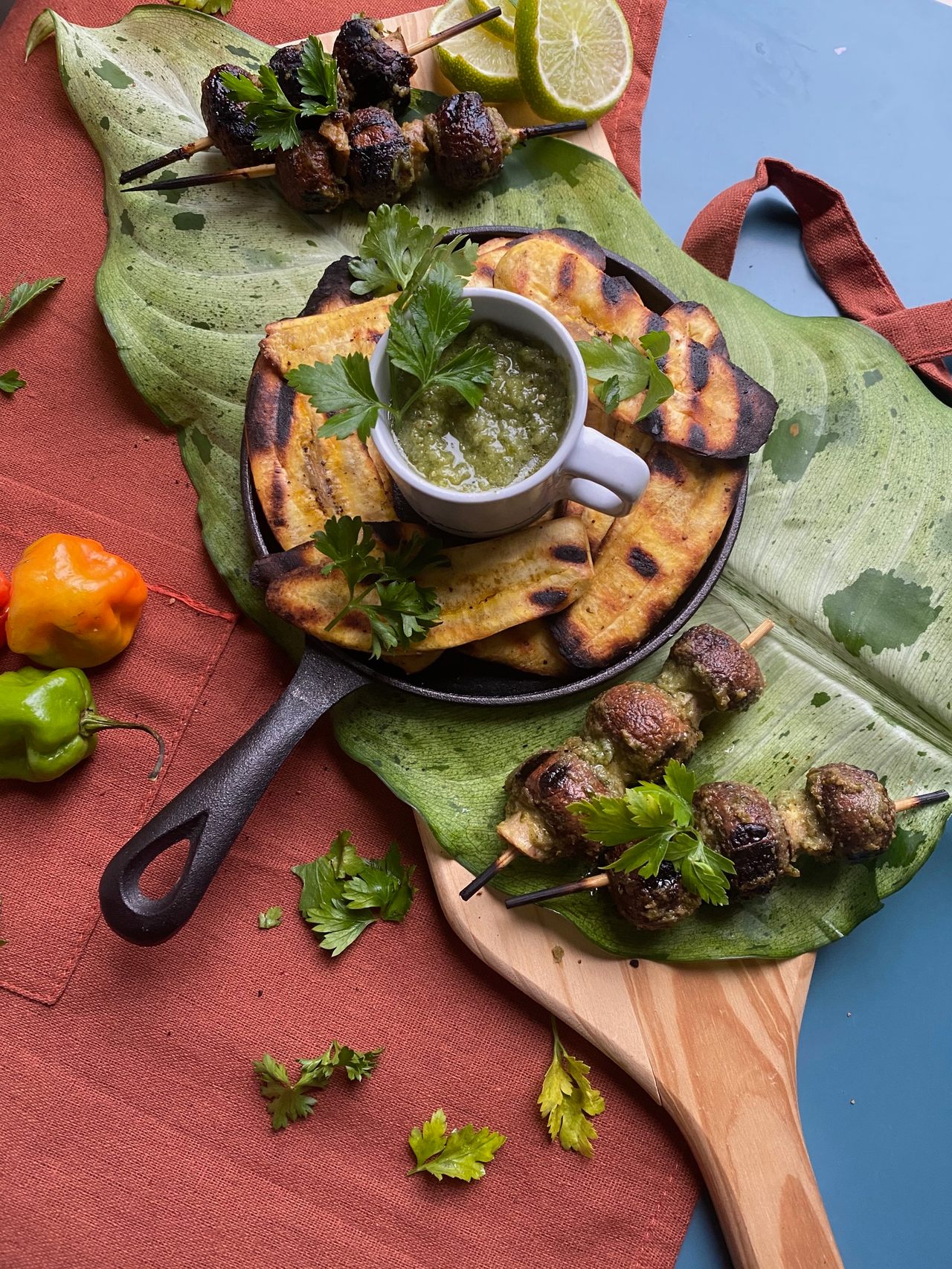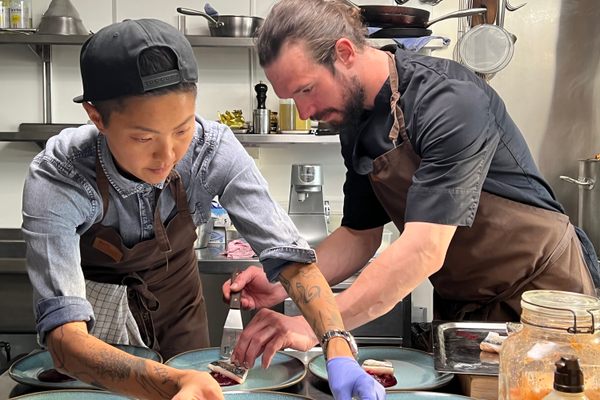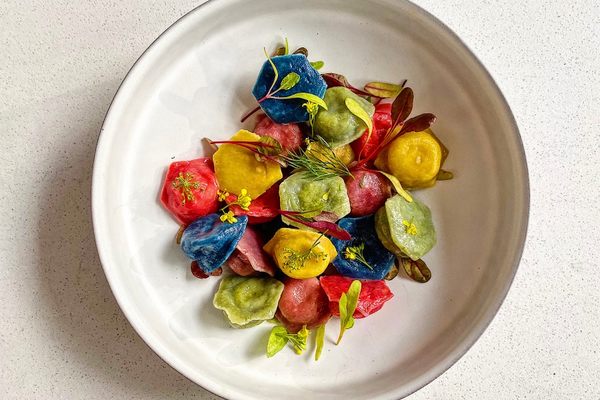Celebrating the Food of West Africa, Vegan-Style
From a region known for meat dishes, plant-based perspectives are emerging.
THIS ARTICLE IS ADAPTED FROM THE OCTOBER 28, 2023, EDITION OF GASTRO OBSCURA’S FAVORITE THINGS NEWSLETTER. YOU CAN SIGN UP HERE.
As some of West Africa’s many cuisines gain international recognition, chefs, cookbook authors, and food vloggers from the region find themselves battling generalizations. One is that West African food centers around animal protein: stewed beef tripe, smoky dried fish, spicy meat skewers.
Meat consumption in West Africa has increased over time due to many factors, including wider access to foods once considered a luxury. But in recent years, a small yet growing number of vegans in West Africa and diaspora communities are approaching their culinary heritage from a different angle.
In 2022, Marie Kacouchia—born in the Ivory Coast—published Vegan Africa, a cookbook with more than 70 recipes from across the continent. In January 2023, over 50 African restaurants in different countries celebrated the continent’s first Vegan Restaurant Week, successful enough that a repeat is planned for November.
Vegan West Africans draw on the plant-based recipes of the past and spotlight native African ingredients that have declined in popularity. As Africa grapples with climate change and the growing risk of food insecurity, vegan West African food represents decolonization and honoring tradition, as well as a model of sustainability that looks to the example of the past for a brighter future. Gastro Obscura spoke with five vegan creators whose work draws on the rich culinary landscape of West Africa.
Interviews have been edited for length and clarity.
Evy Mendes

Raised in Paris, Mendes established the vegan pop-up Cantine Toca in Montreal, where she shares recipes primarily drawn from her multinational heritage, especially the cuisines of Guinea-Bissau and Cape Verde, through catering and cooking classes. In the future, she hopes to use her engineering background to help transform food systems in West Africa for the benefit of local farmers.
How did you become vegan?
My Mom’s from southern Senegal, and over there for Lent, people are vegetarian for 40 days a year. So I grew up having a sensitivity to vegan and vegetarian food. But what made me turn vegan was at university studying chemical engineering, we had to study the impact of food production and specifically animal exploitation on the environment.
What is your process like for developing recipes?
A lot of the food that I make is inspired by food I grew up eating, or I create new recipes to showcase indigenous African ingredients. I also love connecting people within the Black diaspora [through recipes], because we share a lot of ingredients and techniques. For example, I grew up eating cachupa, which is a Cape Verdean national dish, a bean stew that is very similar to Brazilian feijoada. So it depends on what I want to do.
Why is it important to you to share plant-based recipes based on your heritage?
The first thing [that’s important] to me is representation. Black vegans are not necessarily seen in the community, although for example, in the United States, Black people are the fastest-growing group turning to veganism. And there’s a long history of what we now call “veganism” within different Black diasporas.
It’s also to show the creativity and ingenuity of some of the food we make in West Africa. The Lusophone side [West Africans from Portuguese-speaking countries], we are not a big diaspora compared to Nigeria or Ghana. So when I do some dishes from Cape Verde or Guinea-Bissau, or I do a cooking class regarding those foods, people are like, “Woah, you can’t even Google the recipe!” My cooking classes often take off from the stereotypes that people have regarding West African food, especially that there’s a lot of meat or fish. I’m making it vegan, but also showcasing recipes that are already vegan.
Zuu Gbedemah

Known online as “The Ghanaian Vegan,” Gbedemah is based in Accra, Ghana’s capital city. He uses his professional experience in graphic design and video production to document his vegan lifestyle, which includes preparing a variety of international cuisines. “I’m trying to bring more joy into my cooking,” Gbedemah says. “So I’m just experimenting.” He describes his audience as primarily Ghanaians who are interested in becoming vegan and curious about where to start.
How did you become vegan?
Four or five, six years ago, when I decided to try, it was 100 percent for health. But then through my research and my experiences, now, I have so many reasons: sustainability, the environment, animal rights. Really, it was a long, long journey.
One of the reasons why it took me so long to transition [to being vegan] was because I didn’t know where to find resources. I live with my family, and when I became vegan, suddenly, I couldn’t eat the food everybody else was making, so I had to make it myself. I realized that in the local recipes I’m using, I’m barely changing anything. They’re inherently plant-based, and then maybe towards the end people would add in meat.
How would you describe your experience as a vegan living in Ghana? Are vegan options more accessible now than they were in the past?
I’ve definitely met more people who are vegan. There’ve been a couple people who told me that I inspired them to start, which is always a lovely thing to hear. In the beginning when I started—and it’s not even been that long—people would come up to me and be like, “I don’t understand why you’re doing this,” or “this is weird.” Now, more and more people understand it. I can’t take the credit for that; there’s so many other creators around the world.
Why is it important for you to share vegan recipes?
Really, for me, it’s just about education, about exposure. I just want to show people that these things that you love, you can make them vegan. A lot of people tell me they want to be vegan, but they can’t let go of this or that. But you can enjoy the same things with a vegan diet.
Afia Amoako

Amoako is an epidemiology PhD student based in Toronto who runs the Instagram and TikTok accounts @eatwithafia and the blog The Canadian African, focused on plant-based food drawn from her Ghanaian heritage. Amoako invites viewers to learn along with her as she delves into the history and traditional preparation methods of West African food, describing her content as “an open journal of my learning experience about our culture.”
Why is it important for you to share plant-based West African recipes?
My goal is really threefold: One, to make West African food more accessible to North Americans. Two, to make sure that Africa is not presented as a monolith. There’s a lot of misconceptions, so that is really important for me, to harp on the fact that we are different and diverse.
And three, it’s very easy for my generation to lose the information of our ancestors because everything is passed orally, not verbatim but through proverbs, through advice, that is a big part of our culture. For me, the internet is an opportunity to share, and a place that can keep things for a very long time.
How has West African food changed over time, in regards to eating meat?
We live in a global world now. Ghana imports a lot of its food, and with the increase of fast-food chains on the African continent, the food is changing. As more people have money, people are eating more meat.
Eating a plant-based diet, as much as it’s also sustainable, it’s a way for me to honor more traditional ways of eating. When I have conversations with my mother [about plant-based food], she tells me, “The older people ate this way.” And I’m like, “Why don’t we eat like that now?”
That process in which the African continent became more open to the outside world had such a big impact on our agriculture. With European contact, you have the introduction of these other foods that grew faster, that had more calories. There’s a whole encyclopedia called The Lost Crops of Africa. They’re not lost, but a better word is “underutilized.”
It’s sad how much it has changed because of globalization, colonization, enslavement, but all hope is not lost. There are people in Ghana who are really championing our indigenous foods and trying to revive that history. And I’m glad that I have been given a large enough platform to share this.
Do you draw on cultures from outside Africa when you develop vegan recipes?
There’s a lot of things that I’ve learned, especially from Eastern Asian cultures. They have more documented processes of eating plant-based foods. I used to use miso in my soups. [West Africans] have a locust bean that we ferment; they’re very different in flavor [from miso], but the essence of using those fermented oil seeds to add more umami flavor is something that I can respect and see the parallels between cultures.
What kind of responses does your content get from Ghanaians or other Africans?
A lot of people will say, “Our food is vegan-friendly; just remove the meat.” And other people will say that I’m following a “white man’s way of eating.” Because I think the word vegan is just so loaded, and it’s truly a Western concept, so I can understand when people hear that I’m vegan, they’re thinking I’m not “truly” West African. And some people think I’m lying!
Moreso though, people say “just remove the meat.” And I don’t think it’s as simple as that. But the beauty is that we have so many different things in our culture that I use to bring back some of those elements that people might have missed because of meat.
Tomi Makanjuola

Makanjuola is a British-Nigerian chef who blogs under the name “The Vegan Nigerian.” When she pitched a vegan Nigerian cookbook a few years ago, publishers told her “There isn’t enough of a market for this,” Makanjuola says. “But then the more I shared online, and the more interest I saw people taking in it, I thought, Well, that can’t be entirely true.” Readers inspired her to self-publish her book, Vegan Nigerian Kitchen: 100 Classic Recipes with a Plant-Based Twist.
How did you become vegan?
Growing up in Lagos, Nigeria, the idea of veganism never really came to mind. As part of my degree, I had to go away to France for a year to study and work. It was during that time that questions started popping up for me about my food sources.
I was feeling kind of lethargic, and I wondered if there was a connection to my diet. At the same time, I was beginning to discover a bit more about how meat is produced, industrial farming, and everything just kind of came to a head where I thought to myself, the vegan lifestyle aligns with my values. And I felt better; I had more energy, I liked the fact that it was all about compassion, thinking about the planet, thinking about animals and thinking about others. And that was it for me.
How did the idea for your cookbook come about, and what has the response been like?
It was from the feedback I was getting from people who wanted a resource to make the lifestyle easy for them. I thought this would be a really great comprehensive book that has everything that you could possibly think of when it comes to Nigerian food, all the classics and traditional foods that I and a lot of people in Nigeria grew up eating.
[The response] has been really lovely, actually. I had someone the other day comment that she had got the book for her mum, because she, for health reasons, has had to go plant-based, and she had been struggling with finding ways to veganize Nigerian food in particular.
What is your process like for developing recipes?
I always lead with flavor. I really prioritize using spices and seasonings to make the food as tasty as possible. Especially when I’m cooking for close family and friends who are already familiar with the cuisine, I think the fun is in trying to create something that tastes as close to the original as possible. So my technique really is to follow the same traditional cooking methods, but then finding ways to replace the animal products in there in a way that’s still satisfying.
Dishes that make use of meat stock can be trickier to replicate. I think for a lot of people, when they take out the meat, what they’re missing is the texture, the substance. In a way, the food feels too light without it. Using mushrooms for instance in many of our soup recipes is a great way to work around that. If you’re living in the West, using things like tofu, tempeh, or seitan works really well, too. I think it’s not too difficult, but it definitely takes a bit of thought and extra consideration.
Samantha Onyemenam

In her “Culture Tuesday” column for the digital publication Best of Vegan, British-Nigerian food writer Samantha Onyemenam profiles cuisines from around the world, with an emphasis on lesser-known traditions and plant-based options.
How did you become vegan?
I was vegetarian from 10 years old, because I just didn’t really like the taste of meat. Growing up [in Nigeria and the UK], I wasn’t eating a lot of West African food, but as I got older, I felt that I needed to learn more about my culture. So I started talking to people from different tribes in Nigeria and asking how they make their cultural dishes. Then I started looking at how I can make those dishes here in England.
You make a lot of different international cuisines for your column. What is your research process like?
I try to make sure my sources are always people from those cultures I write about. If I meet someone from that country who happens to be plant-based vegan or vegetarian, I ask how their recipe differs from the original [non-vegan] recipe.
When a recipe is veganized, some aspects of how it’s culturally made are gone, but the flavor still ends up being put back into it with other ingredients. If I was making a Nigerian groundnut soup, which is made with peanuts, I found that I can mimic some of the flavor meat adds, by adding tomatoes or other vegetables that are not traditionally in the Nigerian groundnut soup, but they might be in the Ghanaian groundnut soup. So I’m able to piece together elements of different West African cuisines to make a dish that tastes authentic without 100 percent being authentic, as it’s plant-based.
How has meat-eating in West Africa changed over time?
Nowadays, Nigerians eat a lot of beef, but we didn’t have cows before the British colonized Nigeria. A lot of people ate plant-based foods without thinking that they were eating “plant-based”; it was just food.
Meat is seen as a symbol of wealth, and this is mainly because when the Europeans came in, they were eating a lot of meat, and they were considered wealthier, so it became a status symbol. If you are able to eat meat, you’re comfortable, you’re middle-class or upper-class, you have money, people should respect you.
So because of that, even foods that were originally plant-based, just to elevate it, people would add fish or meat, or they do something which they call orisirisi [Yoruba for “variety”], which is to add five, sometimes 10 different types of meat into one dish.
Now, people are paying more attention to dishes that are traditionally vegan. And a lot of people are transitioning to being vegan or vegetarian for health reasons. There’s also huge Lebanese and Indian populations in Nigeria, so that has made people a bit more accepting of plant-based food. And then there’s the community of us who do not live in Nigeria who, if they choose to become vegan, try to recreate dishes in a way that reminds them of what they left behind.
Why is it important to you to share plant-based Nigerian recipes?
People don’t really talk much about West African food. I felt it was important to educate people on what is, in my opinion, one of the most flavorsome cuisines.
There are so many ingredients that you might not find outside communities of Nigerians, and there are a lot of ingredients that you would find in the regular supermarket, but no one would have thought of cooking it the way the Nigerians cook it. Regardless of where you’ve lived, you would have heard about Italian cuisine, French cuisine, but why not Nigerian, Ghanaian, and Sierra Leonean?
Gastro Obscura covers the world’s most wondrous food and drink.
Sign up for our email, delivered twice a week.























Follow us on Twitter to get the latest on the world's hidden wonders.
Like us on Facebook to get the latest on the world's hidden wonders.
Follow us on Twitter Like us on Facebook